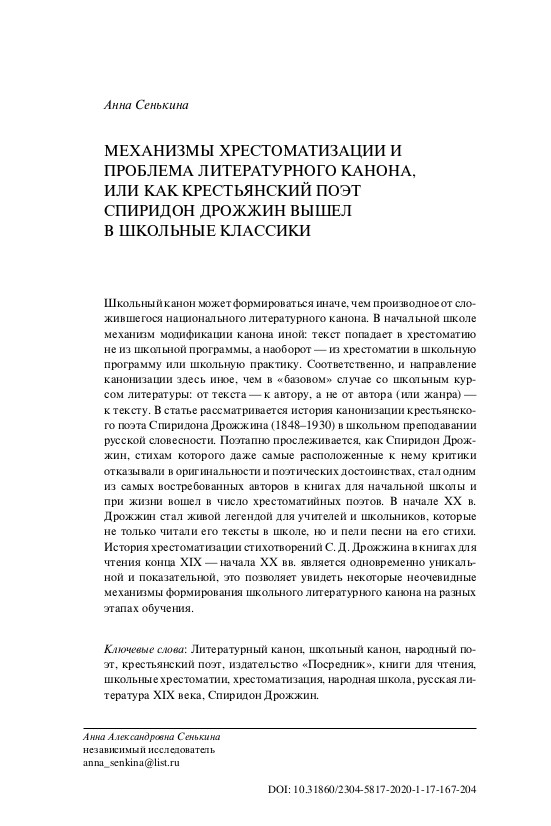The Mechanisms of Anthologization and the Problem of the Literary Canon: How the Peasant Poet Spiridon Drozhzhin Became Part of School Classics
DOI:
https://doi.org/10.31860/2304-5817-2020-1-17-167-204Abstract
The article traces how the self-taught poet Spiridon Drozhzhin, whose poems even the most favorably-disposed critics denied originality and poetic merit, turned into one of the most sought-after authors for elementary school books and, already during his lifetime, became one of the school anthology poets. The first two poems by Drozhzhin were included in the anthologies for people’s schools (books for reading) in the mid-1890s thanks to (1) his earlier publications in children’s magazines, from which the compilers of school anthologies drew material for their collections, and (2) the great interest in the figure of a peasant poet on the part of the narodniki writers affiliated with Leo Tolstoy’s Posredink publishing house (first and foremost, I. I. Gorbunov-Posadov). Further anthologization of Drozhzhin’s texts can be explained by the rapid growth of his popularity as a result of the extremely successful process of construction and promotion of his image as a “peasant/plowman poet”, aided by the numerous reprints of Drozhzhin’s autobiography and his return to the village in 1897. Since the 1910s, Drozhzhin’s texts were present in all new books for reading and in a number of sheet music collections for class singing. The total number of his works included into school anthologies (over 30) exceeded the number of the anthology texts by any one of his high-status predecessors, such as “people’s poets” A. Koltsov, I. Nikitin and I. Surikov — the ones whose follower (and often epigone) Drozhzhin was often seen as. During this period, Drozhzhin’s success in terms of anthology publications becomes a significant factor affecting his overall popularity and lifetime fame, as evidenced, in particular, in the trips made by school teachers and schoolchildren to visit the “beloved poet”, as well as in their letters to him. The history of the anthologization of Drozhzhin’s poems in books for reading of the late 19th — early 20th cc. is both unique and illustrative, as it allows us to observe some unobvious mechanisms of the formation of the school literary canon.
Keywords: School literary canon, people’s poets, рeasant-рoet, Posrednik publishing house, books for reading, school anthologies, anthologization, Spiridon Drozhzhin







